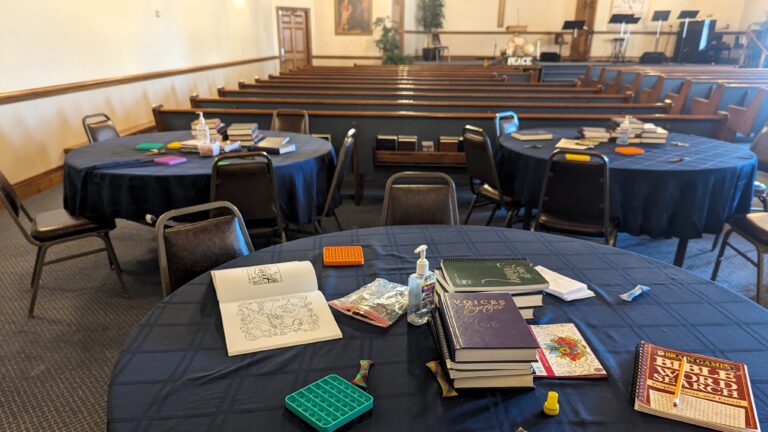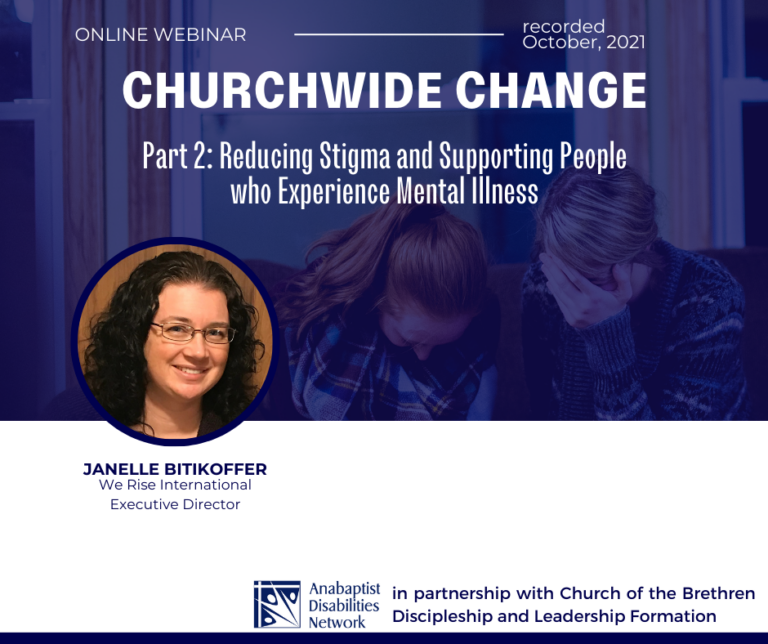Taking the Mystery out of Mental Health
A few weeks ago, as I was assisting with our church’s youth Sunday school class, my secret identity got out. The youth in our class learned that I was a therapist. The response was a mixture of shock and curiosity. One student looked at me with a bit of horror and asked, “So… does that mean you know what I’m feeling right now?” I assured them that I had absolutely zero superpowers.
While not all in the church might come to the assumption that therapists wear their underwear outside of their pants, mental health is often shrouded in mystery in the church, a relevant topic rarely discussed. I say relevant because one in five US adults will experience a mental illness each year. This means that our churches are filled (and pastored) by those who are experiencing mental illness right now. Of those people who are experiencing mental illness, less than half are getting treatment. In fact, the average delay between someone experiencing the onset of symptoms and getting treatment is 11 years. People in our churches are suffering as they experience mental illness without any therapeutic treatment for over a decade before they reach out for help.
There are many reasons why someone might choose not to seek help – lack of awareness, lack of resources, stigma, fear. For me, it might have been some muddled combination of all of these. My first experience seeing a therapist was in college. I was nervous, mostly because I thought I might talk too much… or maybe not enough. I had no idea what to expect, and I also probably really wanted my therapist to like me. Now that I’ve seen a few different therapists over the years and seen a few clients over the years, as well, I’ve learned that taking care of mental health is just as essential as taking care of so many other facets of our lives.
About two years ago, I heard maybe the best and simplest explanation of why it is so important to get support for mental health as I was riding home in a car with a woman and her grandson after a day at the Mennonite Relief Sale. Along the ride, small talk commenced, and the subject came up about my profession as a therapist. The young boy was extremely curious about my job and had some difficulty understanding it. His grandmother explained it like this, “You know how when people get sick or hurt, it helps them to go to a doctor? When people get hurt or feel bad in their mind, it helps them to go see a therapist.” That’s it.
Just a few weeks ago, I saw that woman again at the Mennonite Relief Sale. She reminded me of this conversation and told me that her grandson went home that night and asked his mom if he could start seeing a therapist because he gets angry and sad sometimes and wanted to talk about it with someone. Two years later, and he’s still seeing his therapist and is feeling a lot better.
That story makes me smile as I reflect on the simple power of awareness to change the trajectory of our lives. On Sunday, October 10th, we celebrate World Mental Health Day, a day of awareness. I don’t know how or if you plan to celebrate this day, but I hope that you can find with expanded awareness that the mystery of mental health is that it’s not so mysterious at all. It’s simple enough to be explained to children and universal enough that we have all been impacted in some way.
Below is a poem I wrote in the earlier days of the COVID-19 pandemic. It’s a message of hope – not a hope that things will magically get better or that all will work out. Rather, it is a message of hope that you are understood and okay just as you are. This is a message that I often need to come back to for myself, so I hope that maybe you might hear want to hear it, too.
“What I Want You to Know”
I just want you to know that it's okay
This not being okay
This half-built bookshelf
Upon which you've placed far too much
With hinges now leaning
It's okay
This amalgam of puzzle pieces
From different boxes
That you have hammered into place
You have no idea what image you are making
It's beautiful
I too am sailing a shipwrecked vessel
upon unknown seas
without a compass or a map
You are not alone

Jon-Erik Misz resides in Goshen, Indiana, where he works as a licensed clinical social worker. Some of his favorite people in the world have experienced mental illness, and he views their presence in our church communities as a true gift. He is a member of Waterford Mennonite Church, where his wife, Katie, serves on the pastoral team.
References
Substance Abuse and Mental Health Services Administration. (2020). Key substance use and mental health indicators in the United States: Results from the 2019 National Survey on Drug Use and Health (HHS Publication No. PEP20-07-01-001, NSDUH Series H-55). Rockville, MD: Center for Behavioral Health Statistics and Quality, Substance Abuse and Mental Health Services Administration. Retrieved from https://www.samhsa.gov/data/
Wang, Philip S., Berglund, Patricia A., Olfson, Mark, and Kessler, Ronald C. Delays in Initial Treatment Contact after First Onset of a Mental Disorder. Health Services Research. 2004 Apr; 39(2): 393–416. Retrieved from https://www.ncbi.nlm.nih.gov/pmc/articles/PMC1361014/








